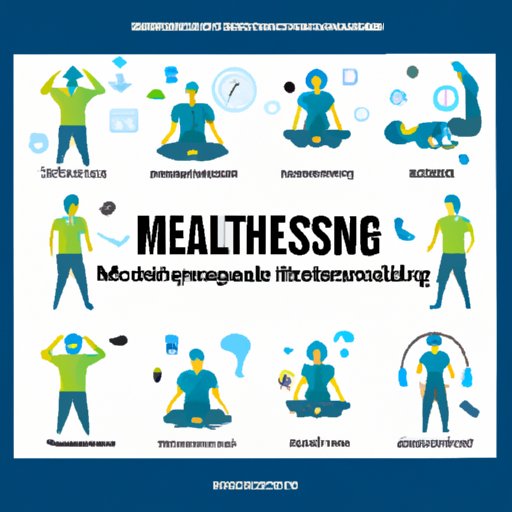Introduction
Mental health is defined as a state of well-being in which an individual realizes their abilities, copes with the normal stresses of life, works productively, and contributes to their community. Mental health is an important aspect of overall health; however, it is often overlooked when discussing physical health. This article will explore the ways in which mental health affects physical health, and how people can seek professional help for mental health issues.
Analyzing the Correlation Between Mental Health Issues and Physical Ailments
The relationship between mental health and physical health is complex. Studies have shown that mental health issues can be linked to physical ailments such as headaches, digestive problems, and fatigue. Let’s take a closer look at how mental health issues can cause physical symptoms.
Stress-Related Physical Symptoms
Stress is one of the most common mental health issues and is often linked to physical symptoms such as headaches, muscle tension, and chest pain. According to Dr. John Grohol, a mental health expert, “It’s not uncommon for those who are dealing with high levels of stress to experience a range of physical symptoms, from digestive issues to headaches and backaches.”
Diet, Exercise, and Sleep’s Role in Mental and Physical Well-Being
Diet, exercise, and sleep are essential for both mental and physical health. Eating a balanced diet, getting regular exercise, and getting enough sleep can help reduce stress levels and improve overall health. According to the Centers for Disease Control and Prevention, “Eating healthy, being physically active, and getting enough sleep are key components of good mental and physical health.”

Chronic Mental Health Conditions and Physical Illnesses
Chronic mental health conditions, such as depression and anxiety, can also have a negative effect on physical health. These conditions can weaken the immune system and increase the risk of developing physical illnesses.
Impact on the Immune System
Studies have shown that chronic mental health conditions can weaken the immune system and make individuals more susceptible to illnesses such as colds, flu, and other infections. According to a study published in The American Journal of Psychiatry, “Depression has been associated with suppression of the immune system, making individuals more vulnerable to infectious diseases.”
Connection to Chronic Pain
Chronic mental health conditions can also be linked to chronic physical pain. Studies have shown that individuals with depression and anxiety are more likely to suffer from chronic pain than those without these conditions. According to a study published in the journal Pain, “Individuals with depression and/or anxiety were significantly more likely to report chronic pain than those without these conditions.”

Seeking Professional Help for Mental Health Issues
Mental health issues can have a significant impact on physical health, so it is important to seek professional help if you are experiencing any mental health issues. There are many benefits to seeking help, including improved mental and physical health.
Benefits of Seeking Help
Seeking professional help for mental health issues can have many positive benefits, including improved mental health and decreased physical symptoms. According to the National Alliance on Mental Illness, “Treatment for mental health conditions can lead to fewer symptoms, better functioning, and improved quality of life.”
Accessing Resources
There are many resources available to those seeking help for mental health issues. Your primary care physician can provide referrals to mental health professionals, and there are also online resources such as helplines and support groups. Additionally, many mental health professionals offer telehealth services, allowing patients to receive treatment from the comfort of their own homes.
Conclusion
Mental health is an integral part of overall health, and mental health issues can have a significant impact on physical health. Stress, diet, exercise, and sleep all play a role in both mental and physical health, and chronic mental health conditions can weaken the immune system and increase the risk of physical illness. Seeking professional help for mental health issues can improve both mental and physical health, and there are many resources available to those in need of help.
(Note: Is this article not meeting your expectations? Do you have knowledge or insights to share? Unlock new opportunities and expand your reach by joining our authors team. Click Registration to join us and share your expertise with our readers.)
